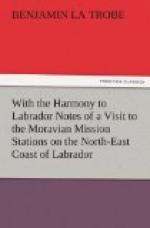To the east of the mission-house there is a pretty waterfall about ten or twelve feet in depth. It is the last leap of a mountain brook, which in summer flows swiftly down the deep ravine, which it has cut. Higher up, a part of the pure, clear stream is diverted as the water supply for the mission-house and the native huts. As at Hopedale and Zoar, this runs off a trough about a hundred yards from the house. At Nain and Okak it is conducted straight into the kitchen, when desired. In winter every station is liable to the freezing of the ordinary supply, and then water must be fetched from a distance, or if none can be found, snow or ice must be melted. Icicles are hanging from the trough here to-day, for though the sun is warm now, there were four or five degrees of frost last night, and the wind is still keen. In spring, when a thaw sets in, this little stream is a source of danger to Ramah. Its deep channel is filled with snow, and the pent-up torrent, seeking an outlet, is apt to escape from its usual bounds and start an avalanche down the steep declivity. When the thaw becomes general, there is a grand series of leaping cataracts and roaring rapids in that ravine.
[Illustration: AN ESKIMO IN HIS KAYAK.]
A FAITHFUL NATIVE HELPER.
I would that young Gottlob, now living at Ramah, might turn out as good a man as his late namesake. Let me take you to old Gottlob’s grave, and there tell you the story of himself and his family. The little “God’s acre” is scarcely an acre, and it should be enclosed. Flat slaty stones, suitable for wall, lie around in abundance, brought down by the avalanche, which a year or two ago endangered the station, but happily did no more damage than destroy the powder-house and devastate the burial-ground. Kegs of powder and tombstones were carried far out on to the ice of the bay. Most of the latter were recovered unbroken and replaced, and among them the one of which we are in search. Here it is, a simple square slate tablet of touching interest. The Eskimo inscription informs us that Gottlob was born in 1816. He was the child of heathen parents at Nachvak, and grew up in paganism. Presently he came under the influence of the Gospel and was baptized at Okak, exchanging his heathen name of Nikkartok for the Christian name which his subsequent life adorned.




